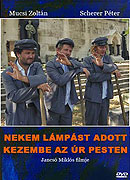
Regie:
Miklós JancsóKamera:
Ferenc GrunwalskyMusik:
György FerencziBesetzung:
Zoltán Mucsi, Péter Scherer, József Szarvas, Miklós Jancsó, Gyula Hernádi, Jácint Juhász, Zsolt Anger, Andrea Ladányi, Zsolt Kovács, Éva Bakos (mehr)Inhalte(1)
In the Kerepesi Street cemetery, three grave diggers contemplate the fate of the world, then they step out of this role and in a sequence of episodes they play the typical figures of contemporary Hungarian reality, the fat cat, the swashbuckler, the victim, underworld chieftains, and present little absurd dramas of love, marriage, friendship, public order and legal safety. The author and the film director walk among them all the time, contemplating, laughing at their plays. The stories starting from the graveyard and returning there warn of the inevitability of death. The author and the director (Gyula Hernádi and Miklós Jancsó) wisely make friends with death. (Verleiher-Text)
(mehr)Kritiken (1)
Truly postmodern and even more post-socialist morality, both in terms of its content and form: the fluid blending of character identities seems to emphasize the emptiness of the new life reality, which, with a wave of the magic wand of the tailor's scissors, suddenly transforms into a lifeless reality of mindless careerism, where life and death hold no greater meaning than the world itself, and thus it is irrelevant whether a character dies or comes back to life. The economic transformation that creates the rich people, killing everyone else on their way up, especially themselves as their past existences, only leads again to a loop of new personal wandering circles of reincarnation, from gravedigger to millionaire and from millionaire to gravedigger, because there is no way out for the world anymore. Jancsó, not only through his metafictional self-insertion into grotesque roles but also with the intentional sociological lifelessness of the characters, reminds us of Godard at the time.
()